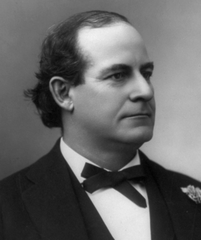
There shouldn’t be anything shocking about the fact that William Jennings Bryan, the leader of the antievolution movement in the United States in the 1920s, misquoted Darwin. The level of scholarship among antievolutionists, then and now, is not high, with misquoted, misattributed, and misinterpreted quotations from scientists in constant uncritical circulation. (The TalkOrigins Archive’s Quote Mine Project is a useful repository of information on such quotations, although it could stand to be updated.) Bryan, whose use of quotations from scientists I discussed in “Bryan’s Quartet” (part 1, part 2, part 3), was certainly no exception. Darwin, as the iconic figure of evolution, is always a tempting target for abuse. (Of the 138 quotations discussed at the Quote Mine Project, sixteen are from Darwin: about 11.5%.) But Bryan’s misquotation of Darwin is, as I’ll show, really something quite special.
When the court in the case of Tennessee v. Scopes adjourned on July 21, 1925, Bryan was left with a closing statement that he hadn’t used. Clarence Darrow, having called Bryan to the stand on the previous day to testify about the Bible and having interrogated him mercilessly for the better part of two hours, blandly suggested that “to save time we will ask the court to bring in the jury and instruct the jury to find the defendant guilty. We make no objection to that and it will save a lot of time and I think that should be done.” Tom Stewart, the chief prosecutor (and later a Democratic senator from Tennessee from 1939 to 1949), assented to the proposal. But a consequence was that there weren’t closing arguments. Although Bryan, like Darrow, briefly gave his view of the significance of the trial (“The people will determine this issue”), he didn’t have a chance to present his statement to the court.
But, as Edward J. Larson writes in his Summer for the Gods (1997), “Bryan remained in Dayton revising his unused closing argument into a fiery stump speech.” At about fifteen thousand words, it would have been a two-and-a-half-hour stemwinder. On July 24, 1925, he traveled to Chattanooga, to arrange to have it published in the Chattanooga News. On the following day, he drove to Winchester, Tennessee, the home of Tom Stewart and Judge Raulston, where he delivered his speech to a crowd of thousands of people. Bryan’s hope, of course, was to deliver it again and again, to audiences across the country, in the following months. But his hope wasn’t fulfilled. On July 26, 1925, Bryan returned to Dayton, where he attended services at a Methodist church, ate a hearty lunch, took a nap, and died in his sleep. His closing statement as revised is available in print, appearing in The World’s Most Famous Court Trial (1925) and in his posthumous Memoirs (1925).
Bryan talks a lot about Darwin in his closing statement, but the misquotation I want to examine occurs in the context of his discussion of the development of Darwin’s views on religion. “He began life a Christian,” Bryan writes, adding, “It may be a surprise…to learn that Darwin spent three years at Cambridge studying for the ministry. This was Darwin as a young man, before he came under the influence of the doctrine that man came from a lower order of animals.” By the end of his life, though, Darwin was telling a correspondent that “I do not believe that there ever has been any revelation,” which Bryan laboriously glosses: “In rejecting the Bible as a revelation from God, he rejects the Bible’s conception of God and he rejects also the supernatural Christ of whom the Bible, and the Bible alone, tells.” Then he quotes Darwin again, from his 1876 autobiography: “I deserved to be called an atheist.” Eh?
Here’s the quotation in full, as it appears in Bryan’s speech as published in The World’s Most Famous Court Trial, quoted from the 1887 life and letters, edited by Francis Darwin; I insert a few clarifications in the customary square brackets.
During these two years (October, 1838, to January, 1839) [the dates in the original are abbreviated and appear in a footnote; the first date was “Oct. 1836”] I was led to think much about religion. Whilst on board the Beagle I was quite orthodox and I remember being heartily laughed at by several of the officers (though themselves orthodox) for quoting the Bible as an unanswerable authority on some point of morality. [The preceding text is from pp. 307–308 of the original; Bryan now skips, without indicating any omission, to p. 312.] When thus reflecting I feel compelled to look to a first cause, having an intelligent mind in some degree analagous [“analogous” in the original, but also in the Memoirs version] to that of man; and I deserved [“deserve” in the original] to be called an atheist [different, as I will explain, in the original]. This conclusion was strong in my mind about the time, as far as I can remember, when I wrote the ‘Origin of Species’; it is since that time that it has very gradually, with many fluctuations, become weaker. But then arises the doubt, can the mind of man, which has, as I fully believe, been developed from a mind as low as that possessed by the lowest animals, be trusted when it draws such grand conclusions?
I cannot pretend to throw the least light on such abstruse problems. The mystery of the beginning of all things is insoluble by us; and I for one must be content to remain an agnostic.
As quoted, Darwin is not making a tremendous amount of sense here, which is not surprising: by skipping almost four pages of the text, Bryan is conflating Darwin’s views on religion from two different periods of his life. I explain further in part 2.

